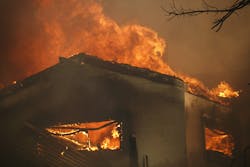WASHINGTON - Partisan disagreements over resource management policies could once again derail efforts aimed at fixing the wildfire budgeting problem.
Administration officials, together with most stakeholder groups, agree solving the budget issue is perhaps the best thing Congress could do to improve forest health and reduce the threat of large, destructive wildfires.
Nevertheless, a Senate Energy and Natural Resources Committee hearing this week highlighted ongoing disagreements about how to address the problem, as well as how closely any proposed fix should be linked to disputes over other forest management practices.
"The concern is that if we take on too many management issues (in the same piece of legislation), we won't be able to end fire borrowing. That, at least, has been the history," said Sen. Ron Wyden, D-Ore., who together with Idaho Sen. Mike Crapo has been working on the issue for several years.
Robert Bonnie, U.S. Department of Agriculture undersecretary for natural resources and environment, noted Congress appropriates wildfire funding for the U.S. Forest Service based on a 10-year rolling average.
However, in years where actual costs exceed the average - as has happened in six of the past 10 years - the agency ends up borrowing funds from other, non-fire programs to make up the difference.
Moreover, the 10-year average has been increasing over time, meaning a larger and larger share of the Forest Service budget goes to wildfires - with less and less available for the type of restoration work needed to reduce the threat of large fires.
"Two decades ago, one-sixth of our budget went to fires," he said. "Today, it's over half. These are funds that are permanently shifted to fire suppression, taking away from critical forest restoration projects, watershed protection, recreation and facilities management. If we want to restore our forests, we have to solve this problem."
Bonnie offered his comments in reference to draft legislation that's sponsored by Senate Energy Committee Chairwoman Lisa Murkowski, R-Alaska, and co-sponsored by Wyden, Crapo, Sen. Jim Risch, R-Idaho, and Sen. Maria Cantwell, D-Wash.
The draft tries to address the fire borrowing problem by fully funding the 10-year rolling average and allowing the Forest Service to tap into federal disaster funds when costs exceed the average.
In low-fire years, the agency would be able to use any remaining funds to pay for forest health initiatives. The proposal also authorizes $500 million over seven years to assist at-risk communities, and provides an expedited environmental review process to speed up certain fuels reduction and forest restoration projects.
The bill also delays finalization of a forest plan amendment in the Tongass National Forest in Alaska until a comprehensive inventory of young growth had been completed.
Bonnie said accessing disaster funds would help solve the fire borrowing problem, but does nothing to address the increasing share of agency funds needed to fight fires.
"The requirement to fully fund the 10-year rolling average for fire suppression means significantly less funding is available every year for restoration and risk-reduction work," he said. "In each of the last two years, we've had to transfer over $100 million into firefighting. We now have 39 percent fewer employees on the non-fire side than the fire side. That affects everything."
The provisions calling for an expedited environmental review also raised concerns for the administration, as well as for some environmental groups.
"Proposals to bypass (environmental reviews) and undermine public and judicial review are outdated and ineffective," said Peter Nelson, senior policy adviser with Defenders of Wildlife. "Producing defensible restoration projects requires smarter - not less - analysis."
Nelson said if those provisions remain in the draft, they will likely lead to greater conflict and opposition.
By contrast, Sen. Steve Daines, R-Mont., said some type of litigation reform is needed to keep "fringe" environmental groups from blocking all timber sales.
"If we're going to fix this problem and move towards responsible timber harvests, we need reforms to litigation," he said. "In Montana, we currently have 21 timber sales under litigation - and 13 of them were developed through collaborative efforts. After we move through a long, collaborative process, fringe groups come in and stop the project."
Washington State Commissioner of Public Lands Peter Goldmark also testified at the hearing, supporting the draft legislation but saying more needs to be done to address the 10-year average.
"For too many years, investments in forest health, thinning and fuel reduction have not kept pace with the amount of risk on the landscape," he said. "This legislation would end the practice of fire borrowing that robs from prevention and fuel-treatment programs. However, it doesn't address the continued structural erosion by rising fire costs."
Although the draft was only released May 27, Murkowski said she hopes to move a final bill through the committee to the Senate floor before lawmakers leave for the October recess.
Spence may be contacted at [email protected] or (208) 791-9168.
———
©2016 the Lewiston Tribune (Lewiston, Idaho)
Visit the Lewiston Tribune (Lewiston, Idaho) at www.lmtribune.com
Distributed by Tribune Content Agency, LLC.






